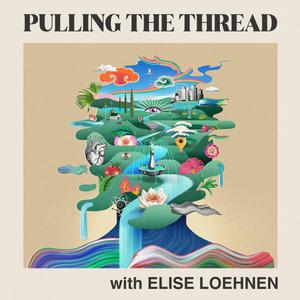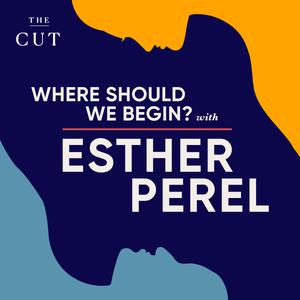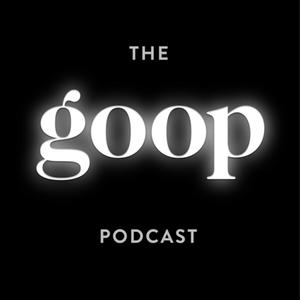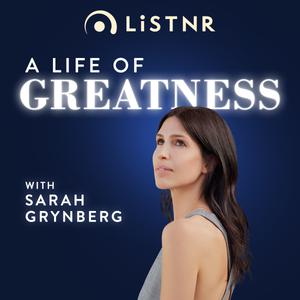
Pulling The Thread with Elise Loehnen
Elise Loehnen and Audacy
- 53 minutes 28 secondsFinding Shadow in the Body (Thomas Hübl)
“I often ask, ‘so how beautiful are you when you need something?’ I call this the beauty of needs. And it's amazing how many of us don't feel beautiful at all when we need something. Like all kinds of other things come up: I'm needy, I feel ashamed, I feel young, I feel afraid, I feel whatever, I feel ugly. Sometimes a hundred people raise their hand and say, I don't feel beautiful at all. But I think given what you said with the anger and the need, I think also the quality of shame, that we feel ashamed to ask because so often that wasn't appreciated and couldn't be contained and that we don't feel beautiful or we don't feel our dignity when we need something.”
So says Thomas Hübl, who you’ve likely heard on my podcast before. This conversation actually happened on his podcast, The Point of Relation, and we went so deep, we decided we needed to do a Part Two, which is coming to you next week. Thomas is the author of two excellent books on collective trauma and resonance: Attuned: Practicing Interdependence to Heal Our Trauma—and Our World and Healing Collective Trauma: A Process for Integrating Our Intergenerational and Cultural Wounds. He does work all over the globe in geographic pockets where a lot has happened, helping people create containers to move the energy up and out. In this conversation, we talked about locating “bad” feelings in our bodies—specifically in the context of On Our Best Behavior—though the practices we discuss here are applicable to anything.
MORE FROM THOMAS HÜBL:
On Pulling the Thread: Feeling into the Collective Presence”
On Pulling the Thread: “Processing Our Collective Past”
Thomas’s Podcast, Point of Relation
Attuned: Practicing Interdependence to Heal Our Trauma—and Our World
Healing Collective Trauma: A Process for Integrating Our Intergenerational and Cultural Wounds
Thomas Hübl’s Website
Follow Thomas on Instagram
To learn more about listener data and our privacy practices visit: https://www.audacyinc.com/privacy-policy
Learn more about your ad choices. Visit https://podcastchoices.com/adchoices
25 July 2024, 4:01 am - 1 hour 31 minutesSigns of High Intuition (Carissa Schumacher): GROWING UP
“When you have a feeling, you can recognize when it's a feeling, when it's a knowing, a lot of knowers, especially automatic channel writers, are like, did I write this? Was I channeling? Did Mary Magdalene write that, you know, where is this coming from? And so they do have the tendency, knowers, to really second guess themselves some of the time or to think I probably made this up or it was a mental thing or primed in my brain. And so with knowers, I really work on helping them to trust what is coming to the surface and not only to trust the knowing, but also to express that knowing. And so one of the qualities of intuitive children, if anyone listening has ever had a child that is just playing, trucks, Barbies, whatever, just playing and then turns around and just says the most profound, wise thing you have ever heard in your life to the point that you're like, are you like Buddha? You have a knower child”.
So says Carissa Schumacher, who long-time listeners will recognize from this podcast. Carissa is an incredible forensic medium—which means that yes, sometimes the police call on her for assistance in solving crimes and yes, she also talks to people on the other side. But as of the end of 2019, she’s also a full-body channel for Yeshua, or Christ Consciousness. This might sound wild—and it is wild—but what’s expressed during these transmissions is also incredible. It’s deeply resonant, lyrical, and profound wisdom that feels so true—and sometimes counterintuitive—that it doesn’t really matter who is its author. Carissa and by extension, Yeshua, have been guiding lights for me in the past four years bringing me ever closer to myself. If you have an opportunity to go to one of Carissa’s journeys and you feel called, do it. They can be life-changing, in both overt and slowly unfolding ways.
I asked Carissa to join me for this special series on GROWING UP because I wanted to ask her about highly sensitive children, empathy, and intuition—both its presence in all of us, and what happens as we grow up that causes it to shut down. For highly sensitive people—of which I know there are many who listen to this podcast, hopefully you’ll hear your own experiences reflected here. For parents of highly sensitive children, I hope what you hear will help. Conversations with Carissa are never short though, so we cover a lot of other ground from recent transmissions—the “in-reality self” versus “the in-theory self” and so much more.
MORE FROM CARISSA SCHUMACHER:
The Freedom Transmissions: A Pathway to Peace
Carissa’s Website
Energy Healer Uta Opitz’s Website
PREVIOUS EPISODES WITH CARISSA:
“Yeshua: Integration not Eradication”
“Understanding Spiritual Power”
“My Spiritual Teacher and Yeshua Channel”
EPISODES IN THE “GROWING UP” SERIES:
Niobe Way, “The Critical Need for Deep Connection”
Harvey Karp, M.D., ”The Long-Term Implication of Sleep”
To learn more about listener data and our privacy practices visit: https://www.audacyinc.com/privacy-policy
Learn more about your ad choices. Visit https://podcastchoices.com/adchoices
22 July 2024, 7:01 am - 45 minutes 55 secondsThe Life-Saving Power of Friendship (Mark Nepo)
“The real meaning of ‘remember’ is to put the members back together, to make whole. So a lot of times we go back in time to a special time or a special moment and nostalgia is wanting to go back there, as if there's something there that we lost. And the true value of memory is to touch that moment and see where it lives or is dormant in me or you now going forward. That was one form or expression of it, not the only. And that touches on, I think what friendship helps us remember is that life is always where we are. We suffer greatly this–and it has always been, but more so in the modern world–this menacing assumption that life is other than where we are. If it's over there, if I could just get over there, even with a dream, or if I could just accomplish this dream, then. And I think one of the things that almost dying taught me was that there's no there, there's only here.”
So says poet and author Mark Nepo, who has now written nearly 30 books, including mega-bestsellers like The Book of Awakening. In this latest book, You Don’t Have to Do It Alone, Mark explores the power of friendship to lend life both vital energy and more meaning, likening friends not to the boat, but to the oars that can help you reach the other side of the water. I’ve been thinking a lot about boys and men lately—including the ways in which they suffer under patriarchy too, sometimes in more devastating ways. I’m grateful for people like Mark who are insisting and modeling that to care is to be human—and that intimate friendships are vital for all of us who hope to lead long and meaningful lives. Women have an easier time of this, though we can all benefit from reminders.
MORE FROM MARK NEPO:
You Don’t Have to Do It Alone: The Power of Friendship
Mark Nepo’s Website
Follow Mark Nepo on Instagram
To learn more about listener data and our privacy practices visit: https://www.audacyinc.com/privacy-policy
Learn more about your ad choices. Visit https://podcastchoices.com/adchoices
18 July 2024, 7:01 am - 54 minutes 20 secondsThe Long-Term Implications of Sleep (Harvey Karp, M.D.): GROWING UP
“I remember a wonderful psychologist was talking about, we shouldn't, should on ourselves. Don't should on yourself. And it's all of what I should do. And there's a big lie for new moms, which is that when the baby is born, you should take care of the baby. You're the best person. You're the mother. There's no one else who's going to take care of your baby in the same way. And of course you should be holding skin to skin, have the opportunity to breastfeed. But there was never a mother who was expected to take care of her baby without the help of her aunt and her grandmother and her sister and things like that. And if you think about it, in the hospital, there's only one place where we make patients take care of other patients, right?”
So says Dr. Harvey Karp, author of The Happiest Baby on the Block which has Bible-like status in the world of parenting. As a beloved Los Angeles pediatrician, Harvey punctured the mainstream with the 5 S’s—swaddling, shushing, swinging, sucking, and holding the baby on its side—all simple interventions that helped parents help their newborns sleep. This was revolutionary—and certainly changed my trajectory as a new parent, as getting five straight hours instead of three can have a huge impact on your mental health. Harvey then codified his findings into “The Snoo,” a bassinet that functions as an extra set of hands: It swaddles, swings, shushes, and keeps the baby safely on its back while it sleeps. In today’s conversation we talk about what it would look like to institutionalize support of new parents, what Harvey’s trying to do about this, why it can be so awful, isolating, and hard to have kids, along with the advice most parents frequently seek. I’m lucky to call Harvey a friend and to be able to turn to him over the years—in fact, Sam slept in a prototype Snoo—so I’m thrilled to share some of his wisdom with all of you. Let’s turn to our conversation now.
MORE FROM HARVEY KARP, M.D.:
The Happiest Baby on the Block
The Happiest Toddler on the Block
Follow Happiest Baby on Instagram
EPISODES IN THE “GROWING UP” SERIES:
Niobe Way, “The Critical Need for Deep Connection”
To learn more about listener data and our privacy practices visit: https://www.audacyinc.com/privacy-policy
Learn more about your ad choices. Visit https://podcastchoices.com/adchoices
15 July 2024, 7:01 am - 59 minutes 22 secondsThe Deconstruction of Belief (Sarah Bessey)
“One of the things about practices that I love is this notion of it's not perfect. I haven't got it mastered, just by the very word, it's implied that I'm working it into my life and out of my life and through my life, almost like in my mind, I'm picturing like a woman who's like kneading it into bread dough. And so then there's the room. There's room to play. There's room to set it aside for a time. There's room to reimagine some of these practices. There's room to expand our notions of belonging and spirituality and faithfulness of our place in the world. And then that to me then opened up and almost reintroduced some of those things that maybe I had once rejected. And thought, well, there's no room for me here. And whether it's prayer, or generosity, or whatever else, it's like, no, I think that there's some good practices here. And I think there's a way to do this in a way that looks like being for things instead of just against things like we already talked about. But then what does it look like to have some room for mistakes and for learning and for humility? And even some play, I think.”
So says Sarah Bessey, the author or editor of five books, including Field Notes for the Wilderness: Practices for an Evolving Faith. Sarah writes most prominently about leaving her evangelical upbringing and working through the deconstruction of her religious beliefs to create something that feels more true to her in its wake—as part of this, she co-founded the Evolving Faith community with some of her friends, including the wonderful and late Rachel Held Evans. Bessey writes prolifically about what it means to connect with her idea of God in a bigger and more expansive way—one that has moved from Simplicity, to Complexity, to Perplexity, to Harmony. In addition to Field Notes for the Wilderness, Sarah is also the editor of the New York Times bestseller A Rhythm of Prayer and Jesus Feminist: An Invitation to Revisit the Bible’s View of Women. In today’s conversation we talked about ideas and processes Sarah holds tenderly, including a shift from peace-keeping to peace-making and trying to articulate a vision of what she is for rather than who she is against. There is much in this conversation to which we can all relate.
MORE FROM SARAH BESSEY:
Field Notes for the Wilderness: Practices for an Evolving Faith
A Rhythm of Prayer: A Collection of Meditations for Renewal
Out of Sorts: Making Peace with an Evolving Faith
Jesus Feminist: An Invitation to Revisit the Bible’s View of Women
Follow Sarah on Instagram
Subscribe to Sarah’s Newsletter
Sarah’s Website
To learn more about listener data and our privacy practices visit: https://www.audacyinc.com/privacy-policy
Learn more about your ad choices. Visit https://podcastchoices.com/adchoices
11 July 2024, 7:01 am - 1 hour 16 secondsThe Critical Need for Deep Connection (Niobe Way, PhD): GROWING UP
“You can't be independent if you're not deeply connected. So what happens to a child that's not deeply connected? What actually happens? Guess what happens? They don't feel the confidence to be able to take risks. They don't feel the confidence to go out and be self-sufficient. They don't feel the confidence in doing it. So we're actually backbiting, right? We're kicking ourselves in the asses when we just focus on independence. Because we need to give them the skills to be able to be independent, which are relational skills, which is knowing that when I need help, I can turn to you and you will help me and I will help you when you need it. So then you can go off and take a risk or go and live in a new city or go have your own apartment and know that you can lean on me when you need to. And so to me, the attachment story that comes out, at this point, almost a century of research on attachment is a gorgeous, gorgeous story.”
So says Dr. Niobe Way, an internationally-recognized Professor of Developmental Psychology, the founder of the Project for the Advancement of Our Common Humanity (PACH) at NYU, and the Director of the Science of Human Connection Lab. She is also a Principal Investigator of the Listening Project, funded by the Spencer Foundation, the Chan-Zuckerberg Initiative and the Rockefeller Foundation. When she was a student, Niobe studied with Carol Gilligan—if you read my newsletter or listen to this podcast, you know Carol is a hero of mine and will be wrapping up this series as a guest. Niobe has done for boys what Carol has done for girls—and their research intersects and Venn diagrams in fascinating ways. While Carol’s research shows that girls come to not know what they know, Niobe traces how boys disconnect from their caring and often enter a period of irrevocably devastating and dangerous loneliness. Niobe is the author of Deep Secrets: Boys’ Friendships and the Crisis of Connection as well as the just-released, Rebels with a Cause: Reimagining Boys, Ourselves, and Our Culture, which offers fascinating insight into our culture at large. Along with historical context, Niobe offers beautiful case studies from her research—following and interviewing boys as they grow up—along with notes from boys who have gone on to wreak havoc on the culture, in homicidal and suicidal ways. These notes speak to disconnection, extreme loneliness, and feeling like nobody cares. As I talk about my book in living rooms around the country, I often cite Niobe and Carol Gilligan, specifically the insight that at a certain point—around 8 for boys, and 11 for girls—the word “don’t” enters children’s vocabulary. For girls, it’s “I don’t know.” For boys, it’s “I don’t care.” And of course, girls knows. And of course, boys care. We need to repair our culture so it’s safe for them to stay connected. As you can tell, I’m very excited for this conversation.
MORE FROM NIOBE WAY, PhD:
Rebels with a Cause: Reimagining Boys, Ourselves, and Our Culture
Deep Secrets: Boys’ Friendships and the Crisis of Connection
The Crisis of Connection: Roots, Consequences, and Solutions
Niobe Way’s Website
To learn more about listener data and our privacy practices visit: https://www.audacyinc.com/privacy-policy
Learn more about your ad choices. Visit https://podcastchoices.com/adchoices
8 July 2024, 7:01 am - 51 minutes 8 secondsThe Table Stakes of Good Relationships (Stan Tatkin)
“Our anger is “I'm angry because something happened that I feel was unjust or unfair” And if it continues, then I want my justice and you know, our injustices from childhood turn out to be society's burdens because I want payback here, even though you had nothing to do with it. So, hate and love go together because they're both strongly bonding connection, right? But really bond us in order to hate you, I've got to feel a lot about you, right? You did something to betray me, to violate me, to say, no, I can't do this, whatever it is. And so both are really strongly bonded, you know, just like anger is bonding. When we're angry with each other, it's a way to stay bonded and connected, even though it's unpleasant.”
So says Stan Tatkin, an author, therapist, and researcher who guides couples toward more durable relationships. He developed the Psychobiological Approach to Couples Therapy (PACT), a non-linear approach that explores attachment theory to help couples adopt secure-functioning principles: In short, Stan and his wife, Tracey, train therapists to work through a psychobiological lens. Often, our brains get away from us when we’re in conflict in our relationships—we lose ourselves to our instincts. He has trained thousands of therapists to integrate PACT into their clinical practice, offers intensive counseling sessions, and co-leads couples retreats with his wife. Tatkin is also an assistant clinical professor at the David Geffen School of Medicine at UCLA.
Stan wrote Wired for Love: How Understanding Your Partner’s Brain and Attachment Style Can Help You Defuse Conflict and Build a Secure Relationship more than a decade ago and it became an instant classic. It was due for a refresh to encompass the wider range of relationships we’re now experiencing and it’s just been re-issued, better than ever.
In today’s conversation we talk about the table stakes of a good relationship: Nobody cares about your survival more than your partner, something we easily forget. As it were, we get into a fascinating sidebar on Pre-Nuptial Agreements, which in Stan’s estimation cause many relationships to founder. I’ll let him tell you why.
MORE FROM STAN TATKIN:
In Each Other’s Care: A Guide to the Most Common Relationship Conflicts and How to Work Through Them
Stan Tatkin’s Website
Follow Stan on Instagram
To learn more about listener data and our privacy practices visit: https://www.audacyinc.com/privacy-policy
Learn more about your ad choices. Visit https://podcastchoices.com/adchoices
3 July 2024, 7:01 am - 1 minute 20 secondsComing Soon: Special Series on Growing Up
Hi, It’s Elise, host of Pulling the Thread. Starting next Monday, I’m doing another special series—this one is about growing up, and no, it’s definitely not just for parents. It’s mostly about re-parenting, or understanding the driving factors of how we all come to understand the world. You’ll hear from four very different voices about childhood, social programming, and development. Two are pioneers in gender development: One of my all-time heroes, developmental psychologist Carol Gilligan, who I write about in my Substack all-the-time who wrote In a Different Voice in the ‘80s, is joining me on the show, and so is Niobe Way, who does for boys what Carol Gilligan does for girls. I’m also talking with legendary pediatrician Harvey Karp, creator of The Happiest Baby on the Block, the founder of the Snoo, and an ardent and early environmentalist—and Carissa Schumacher, a full-body psychic medium and dear friend who is going to talk to us about what it’s like to raise and be a highly empathic and intuitive person—and how you can retain and develop those abilities. Or shut them down. It will be a great series, coming every Monday for the next month. I’ll see you every Thursday for a regular episode.
To learn more about listener data and our privacy practices visit: https://www.audacyinc.com/privacy-policy
Learn more about your ad choices. Visit https://podcastchoices.com/adchoices
1 July 2024, 7:01 am - 58 minutes 52 secondsUnderstanding Your Energy (Prune Harris)
“So when we think about this, what is the aura? Many people have an idea of the aura as something that is around you and a lovely bubble or sphere of energy. Maybe you've seen pictures of an egg shape, but what's really important to understand about the aura is that it comes from inside you and it's only as strong as your vitality. So you can think about the aura as essentially being a vibrational field that is being vibrated out of your cells. So now how are your cells? Are you eating in ways that really activate your body system or not? Are you living in ways that support your vitality or not?”
So says Prune Harris, who has been able to see, study, and shift energy fields since she was born—a gift she didn’t fully realize she didn’t share with everyone else. Prune is an incredible teacher—I’ve been lucky enough to work with her—because can take esoteric and complex energy systems and distill them into metaphors, concepts, and practices that are both easy to understand and easy to do. She has taught me so many simple holds and gestures that have had a direct impact on helping me calm myself down and feel more contained and grounded. She’s the author of a great guidebook, Your Radiant Soul: Understand Your Energy to Transform Your World, and she has an incredibly comprehensive Youtube channel where she teaches simple practices. She’s wonderful. In today’s conversation we cover a lot of ground—from basic holds and energy systems to why most of us need to also ground up. We also discuss the auric membrane and what happens when it gets punctured, by other people, the energy of the world, and psychedelics.
MORE FROM PRUNE HARRIS:
Your Radiant Soul: Understand Your Energy to Transform Your World
Prune’s Website
Follow Prune on YouTube
Follow Prune on Instagram
To learn more about listener data and our privacy practices visit: https://www.audacyinc.com/privacy-policy
Learn more about your ad choices. Visit https://podcastchoices.com/adchoices
27 June 2024, 7:01 am - 53 minutes 52 secondsWhere the Brain and Mind Meet (Karl Deisseroth, M.D., PhD)
“What optogenetics does is it's an engine of discovery. It helps us identify what matters, what's causing things to happen in the brain. And we know now the cells and the connections make these powerful motivations and drives manifest. That opens the door to any kind of new treatment, right? If you know the cells, then you can look at the DNA and the RNA in those cells. You can see what proteins those cells are making, and that gives you clues for medication targets. You can say, okay, this cell has these proteins on its surface, that would give us an idea for a pill, for a medication that might act specifically on that cell that now we know for the first time is causal. It's not just correlated with, it's actually causing these symptoms or the resolution of these symptoms. And if we can now design a medication that targets that cell, we might have a treatment.”
So says Karl Deisseroth, a psychiatrist, neuroscientist and bioengineering professor at Stanford. Karl is also the author of Projections: The New Science of Human Emotion, which is a beautiful revisitation and exploration of his time as a psychiatry resident, where he encountered all sorts of people who didn’t quite understand what was happening to their brains—and by extension their minds.
In the book—and in our conversation today—Karl explores mania, autism spectrum disorder, eating disorders, borderline personality disorder, psychopathy, and dementia, all in gorgeous prose. Karl runs a lab at Stanford that focuses on optogenetics, mind-blowing science that can pinpoint where adaptive and maladaptive behaviors begin in the brain. He’s won the Kyoto Prize and Heineken Prize for his research, which is not surprising—it just might change the entire world of psychiatry.
Today’s conversation is far-ranging and it’s also surprising, including a conversation about how some of these disorders—like eating disorders, which can be deadly, can also be strangely adaptive. Please stick with us.
MORE FROM KARL DEISSEROTH, M.D., PhD:
Projections: The New Science of Human Emotion
Follow Karl Deisseroth on Twitter
To learn more about listener data and our privacy practices visit: https://www.audacyinc.com/privacy-policy
Learn more about your ad choices. Visit https://podcastchoices.com/adchoices
20 June 2024, 7:01 am - 1 hour 20 minutesTo Transcend and Include (Ken Wilber)
“All growing up stages are the product of scientific investigation of the stages of growing up that people go through. And those are all defined in third person terms because they're the person or thing being spoken about. When we talk about the archaic stage or the magic stage or the mythic stage, if you look within right now, you can't see any of those stages. As a matter of fact, before we had this conversation, you had no idea that you had all these six to eight stages of growing up that you will go through. You didn't know anything about those because you can't see them. They're not first person or even second person phenomena. They're third person, the person or thing being spoken about.”
So says Ken Wilber, whose work and intellect is difficult to describe. Throughout a long career—and the authoring of 20 books, including A Brief History of Everything, Grace and Grit, Sex, Ecology, Spirituality, and The Religion of Tomorrow, Wilber has put together what is essentially a synthesis of every psychological model of development. In fact, he locked himself away for years, writing every model down on pieces of yellow legal paper, and then knit them all together. I’ve written about Wilber’s work at length in my newsletter, which is also called Pulling the Thread—I’ll put links in the show notes—and I talk about his work on this show as well. Most recently, I talked about Ken Wilber with Nicole Churchill in our conversation about Spiral Dynamics. Wilber is a Spiral Dynamics wizard, though he uses it in aggregate with the work of other developmental thinkers, integrating the work of luminaries like Carol Gilligan, Robert Kegan, and others.
In today’s conversation, we talk about Wilber’s brand new book, Finding Radical Wholeness, which explores the five big processes we all undertake in our lives. In today’s conversation, we mostly talked about two: Waking Up and Growing Up, which are often conflated. Wilber makes the case for why they are unrelated processes—and the essential nature of the latter. While Waking Up, or having a Satori experience is wonderful—and something that 60% of people report—we all need to grow up. Wilber and I spend most of today’s conversation talking about our political environment from the standpoint of developmental psychology: Why we’re so fractured, and what it will look like when the Integral Stage becomes the leading edge of culture and we learn how to include and transcend. I think this is fascinating, and reassuring, and excellent context for a moment that feels so out-of-control.
MORE FROM KEN WILBER:
More books from Ken Wilber
More from Pulling the Thread Podcast:
“The Basics of Spiral Dynamics” with Nicole Churchill
“Our Collective Psychological Development” with John Churchill
More from Pulling the Thread Newsletter:
To learn more about listener data and our privacy practices visit: https://www.audacyinc.com/privacy-policy
Learn more about your ad choices. Visit https://podcastchoices.com/adchoices
13 June 2024, 7:01 am - More Episodes? Get the App
Your feedback is valuable to us. Should you encounter any bugs, glitches, lack of functionality or other problems, please email us on [email protected] or join Moon.FM Telegram Group where you can talk directly to the dev team who are happy to answer any queries.
 Where Should We Begin? with Esther Perel
Where Should We Begin? with Esther Perel
 The goop Podcast
The goop Podcast
 A Life of Greatness
A Life of Greatness
 Bewildered
Bewildered
 We Can Do Hard Things
We Can Do Hard Things
 Sounds True: Insights at the Edge
Sounds True: Insights at the Edge